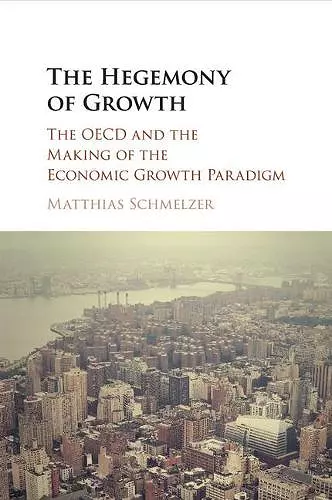The Hegemony of Growth
The OECD and the Making of the Economic Growth Paradigm
Format:Paperback
Publisher:Cambridge University Press
Published:19th Oct '17
Currently unavailable, and unfortunately no date known when it will be back
This paperback is available in another edition too:
- Hardback£105.00(9781107130609)

The first comprehensive historical overview of the OECD's role in the concept of economic growth becoming an international norm.
How did the pursuit of economic growth become the core goal of economic policymaking? Focussing on the OECD, Schmelzer offers a first transnational history of growth discourse, tracing how the methods employed to measure, model and prescribe growth resulted in new statistical standards, international policy frameworks and widely accepted norms.In modern society, economic growth is considered to be the primary goal pursued through policymaking. But when and how did this perception become widely adopted among social scientists, politicians and the general public? Focusing on the OECD, one of the least understood international organisations, Schmelzer offers the first transnational study to chart the history of growth discourses. He reveals how the pursuit of GDP growth emerged as a societal goal and the ways in which the methods employed to measure, model and prescribe growth resulted in statistical standards, international policy frameworks and widely accepted norms. Setting his analysis within the context of capitalist development, post-war reconstruction, the Cold War, decolonization, and industrial crisis, The Hegemony of Growth sheds new light on the continuous reshaping of the growth paradigm up to the neoliberal age and adds historical depth to current debates on climate change, inequality and the limits to growth.
'In this well-researched intellectual and institutional history, Schmelzer brings to light the story of how Europe and America in the mid-twentieth century embraced the cult of Gross National Product (GNP), and the role of the Organization for Economic Cooperation and Development (OECD) in the process. By devising the system by which governments keep economic score, economists and bureaucrats revised the goals of economic policy to emphasize, almost to the point of worship, GNP growth. Schmelzer's book explains lucidly how economic policy acquired its topmost priority of the past seventy years.' J. R. McNeill, author of Something New Under the Sun: An Environmental History of the Twentieth-Century World
'A magnificent accomplishment. Moving between deft analyses of the OECD and sweeping appraisals of global political economy, Matthias Schmelzer reveals the tumultuous history behind the seemingly timeless commitment to economic growth. Essential reading for scholars, The Hegemony of Growth is just as valuable for perplexed observers of the contemporary world. In the best tradition of historical research, Schmelzer rewrites the past, troubles the present, and opens up new ways of imagining the future.' Timothy Shenk, author of Maurice Dobb: Political Economist
'This fresh and important work recovers the contested past of national accounts as a tool to study and manage the economy. The OEEC and the OECD is stage and actor in Schmelzer's sophisticated appreciation of historically contingent value, and limits, of the idea of growth.' Patricia Clavin, author of Securing the World Economy
'Looking deeply into the question of whether the rich world can and should remain hellbent on growth is interesting and very useful. Agree or disagree, readers will find much here to spark their imaginations.' Bill McKibben, author of Deep Economy
'Economic growth is our prime social objective. How this came to be is shown by means of a careful and critical scrutiny of the OECD since 1947, which also questions the concept of growth itself. You won't find it anywhere else, let alone done so well.' Avner Offer, author of The Challenge of Affluence
'What are the origins of the idea of economic growth, and how and why did it come to be so hegemonic? Matthias Schmelzer's in-depth analysis of 'growthmanship' in the OECD is a must-read for anyone interested in these questions.' Giorgos Kallis, editor of Degrowth: A Vocabulary for a New Era
'Schmelzer has written a first-rate, pioneering and highly differentiated historical study of the rise of one of the most powerful concepts of our times, the concept of economic growth, and the crucial role played by the OECD.' Hartmut Kaelble, author of A Social History of Europe
ISBN: 9781107587557
Dimensions: 230mm x 155mm x 22mm
Weight: 580g
396 pages